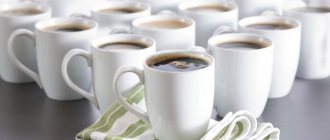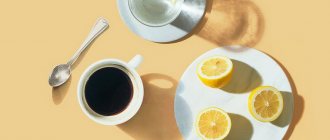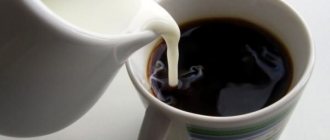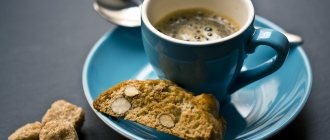Let's sort out the myths about ☕
There is a persistent stereotype: drinking coffee is harmful. It is advised to avoid it in the heat, during a cold or exacerbation of a chronic disease.
The news regularly writes about scientists who have proven yet another “miraculous” property of coffee, but the stereotype remains. Let's explain what's wrong with most of the coffee studies you've probably read about. And we answer the most important questions about the controversial drink.
They say coffee helps you lose weight
It's hardly worth counting on. There are several scientific theories about how caffeine affects weight, mainly talking about two of its properties:
Appetite suppression. Caffeine can indeed reduce hunger, but only for a short time. In theory, drinking a cup of coffee can give you some reprieve. But then hunger will take its toll.
Burning calories. Caffeine stimulates thermogenesis, the process by which the body produces heat and energy when digesting food. By drinking coffee, you increase energy expenditure, which means you burn calories.
Some studies have shown that even drinking decaffeinated coffee can cause minor weight loss. That is, it may be due to other substances contained in coffee.
However, it is important to keep a few things in mind. Firstly, there is still not enough reliable research in humans to confirm that coffee really helps you lose weight. Existing studies were either of low quality or were conducted on animals. Second, there is no reliable data on what doses of caffeine can have a meaningful effect on weight loss and still be safe for your health (so, please, no caffeine-based “weight loss” supplements!). And thirdly, if you drink coffee with milk and/or syrup, then there is no question of burning calories.
Calorie content of coffee beans
Freshly picked coffee beans contain proteins, carbohydrates, fatty acids and various vitamins. Coffee beans also contain essential oils, alkaloids, caffeine, fiber, tannin, and chlorogenic acid. These are not all the components that are in coffee. All components have not been fully studied, but their part is so tiny compared to the main substances that they cannot have any special effect on the body. And when the grains undergo heat treatment, the concentration of all components changes. In particular, the content of fats, carbohydrates, and caffeine decreases, and the concentration of proteins increases.
I wonder if coffee makes you fat? It is impossible to gain weight after one cup of espresso. The calorie content of the drink is approximately equal to two kcal per hundred milliliters of product. To gain weight, you need to drink espresso with high-calorie additives. These can be: heavy cream, chocolate, alcohol, sugar, full-fat milk, ice cream. Those who like to drink coffee with sweet baked goods, sandwiches, burgers, high-calorie sandwiches, etc. also get better.
If you are on a diet, then drink coffee without sugar or other additives. This drink is recommended by nutritionists for weight loss, if there are no health problems.
They say coffee causes dehydration
This is wrong. It has long been believed that coffee can cause dehydration, so it is still not recommended to drink it during the summer heat or when there is a risk of dehydration due to illness.
Surely some of you have noticed that coffee has an increased diuretic effect. This usually happens if you drink coffee quite rarely. The diuretic effect is observed only at the beginning of drinking caffeinated drinks or after a long break. But if you drink coffee regularly (4-5 days in a row), the body develops tolerance to this effect. Therefore, it cannot be said that regular coffee consumption causes chronic dehydration.
In addition, recent studies have found that not only water replenishes the necessary fluid in the body, but also other drinks, including coffee. Therefore, if you choose between “not drinking anything” or “drinking coffee,” the latter is preferable.
And finally, what about dry mouth? For some people, drinking caffeinated drinks actually causes/worsens dry mouth. In this case, you need to focus on your own feelings. And if your dry mouth is chronic and seriously bothers you, then you should consult a doctor - this can not only be a side effect of drinking coffee or certain medications, but also a symptom of the disease.
How to get rid of cellulite
Coffee makes you lose weight or gain weight, depending on how you consume it as a drink. You can use another method - wrapping with coffee gruel, if there is cellulite on areas of the skin. This is more of an aesthetic problem, since cellulite can occur in thin people.
The problem is an increase in the volume of adipocyte cells that make up subcutaneous fat. The reason is a violation of blood flow and lymph movement. Cellulite cannot be defeated from the inside - you need special skin masks that will speed up metabolism and increase blood flow to areas with an “orange peel” appearance.
Video: Does coffee help you lose weight - the whole truth!
Caffeine will help here, but will not harm other organs and systems. To make the wrap, you need to prepare a paste from fresh ground beans - green ones are better, as they contain more caffeine. The amount depends on the size of the cellulite area.
Mode of application:
- The grains are poured with warm water and kneaded until smooth.
- Apply to the skin.
- Cover with film.
- Cover with a blanket on top.
You need to stay in such a greenhouse for 1 hour, then wash off the pulp from the skin.
Caffeine opens pores and stimulates blood flow, accelerates the removal of excess fluid and renews tissue.
They say coffee can cause heart problems
In short, this theory has no clear evidence. But there is evidence that women who drink coffee are statistically less likely to die from cardiovascular diseases (CVD) than those who do not drink coffee. In addition, those who drink up to 4 cups of coffee per day are 11% less likely to suffer from heart failure.
There are many studies on the connection between coffee consumption and CVD risk. The most recent ones show an inverse relationship: in groups of people who drink coffee, mortality from CVD decreases, not increases. However, in general, we can say that there is no reliable evidence yet that drinking coffee increases or decreases the risk of CVD. And that's why.
For example, the media often refer to a large-scale joint study by American and British scientists published in 2013 in the medical journal Mayo Clinic Proceedings. It allegedly established a connection: if you drink more than 4 cups of coffee a day, the risk of early death, including from CVD, increases. However, a review by Britain's National Health Service explains in detail why these findings are wrong. The main thing is this: the excess coffee consumption of study participants was usually associated with other unhealthy behavior patterns (poor diet, smoking, sleep disturbances). This means that it cannot be argued that it was coffee that caused early (before 55 years of age) death.
And this is a typical example of such studies: there is a connection, but it is not clear where the cause is and where the effect is.
In a similar situation, a 2022 study of people over 35 shows that the coffee drinking group has an overall lower mortality rate than non-coffee drinkers. In particular, coffee drinkers of both sexes are less likely to die from diseases of the digestive system, and women are also less likely to die from CVDs, including stroke. Where is the cause and where is the effect? Unknown, as in the previous example.
Dietary characteristics of coffee
Due to its low caloric content and tonic effect, the dietary characteristics of the drink are undeniable. So, does coffee make you lose weight? Anyone who wants to lose extra pounds can drink espresso without sugar. The drink satisfies hunger and has diuretic properties. There are even espresso fasting days and coffee diets, the diet of which consists of low-calorie foods. It is enough to follow such a nutrition system for just a while, the result will not be long in coming.
Before going on a coffee diet, be sure to consult with your physician. He will accurately determine whether you can drink coffee on a fasting day or not. If you have certain diseases, this diet is contraindicated. If there are no deviations in the functionality of the gastrointestinal tract, cardiovascular system, adrenal glands, kidneys, then there will be no harm from the diet.
Since coffee beans contain caffeine, coffee speeds up metabolism and, due to increased lipid metabolism in the body, fat cells are burned. The higher the caffeine content in the coffee powder, the faster the process occurs. But don’t get too carried away with strong coffee - this can lead to insomnia and other unpleasant consequences.
Some nutritionists advise having a fasting day with coffee and low-calorie foods or chocolate once a month. To do this, you should drink three cups of unsweetened espresso: in the morning, at lunch and as an afternoon snack, and eat one hundred grams of dark chocolate or cottage cheese with vegetables. You should also drink other liquids throughout the day to avoid metabolic disturbances in the body. With such a diet, a person can lose up to one kilogram of weight.
When a person restricts himself in nutrition, internal anxiety appears, mood worsens, and even depressive disorders appear. Espresso will help you cheer up and give you a boost of energy.
They say coffee causes cancer. Or does it still prevent it?
There is no clear answer here either. And in short, you shouldn’t be afraid of coffee, but you also don’t need to drink it specifically to “prevent” cancer.
For example, the British National Medical Service reports a truly high-quality and reliable study by Japanese scientists who found that drinking even one cup of coffee a day can reduce the risk of developing cancer of the oral cavity and esophagus. That is, some (it is not clear which) components of coffee may have a protective effect on the oral cavity and esophagus. However, an important caveat: the study was only conducted in Japan, where the composition and method of preparing/consuming coffee may differ from other countries. That being said, the best way to reduce the risks of this type of cancer is not by drinking coffee at all, but still by quitting smoking and alcohol (the main risk factors for this type of cancer).
In most cases, it is impossible to say that there is a reliable connection between coffee consumption and the risk of cancer. In general (but not always), people who drink coffee have a lower risk of disease and early death than those who don't drink coffee. However, it is not known whether it is coffee that helps them in this or whether they can drink it calmly because they are initially in good health.
Therefore, to the question “Is it worth drinking coffee to reduce the risk of disease and live longer” the answer is unequivocal - no. Should moderate coffee consumption be a concern due to cancer risks? No.
Why do people gain weight after drinking coffee?
Let's find out - is it possible to gain weight from coffee? Some athletes have noticed that when you drink a drink after a sports workout, you gain weight. Is it true that coffee makes you fat? Most likely, this is not due to the espresso itself, but due to what else you consume along with the drink. For many, strong drinking stimulates the appetite. And a cup of aromatic coffee is always associated with sweet, hearty cakes or other pastries.
Lucky are those people who do not gain weight after such meals. They have a fast metabolism. Thanks to such snacks, their strength is simply replenished. And they train in order to maintain their already excellent shape, and not to lose weight. These people don’t necessarily need to drink coffee and go on diets. Their body copes well with processing food on its own.
Even one cup of strong espresso at night out of habit can cause a sleepless night. I wonder if coffee makes you fat at night or not? Most likely, they are not getting fat because they don’t sleep, but because this wakefulness is fraught with unplanned snacks after six in the evening or even at night. This is exactly why they gain weight.
One serving of Frappuccino coffee with chocolate and heavy cream replaces dinner and contains 575 kcal.
They say that people with high blood pressure should not drink coffee.
This is a persistent stereotype. In fact, it is possible if you are used to drinking it and do not notice a deterioration in your health after drinking it.
Drinking coffee does increase blood pressure. Hence the feeling of cheerfulness. However, firstly, the pressure increases slightly (up to 10 mmHg). Secondly, not for long (for 10-15 minutes, and then it decreases on its own without additional manipulations). And only for those people who rarely drink coffee. If a person (even with hypertension) is used to drinking coffee every day, then he may not be afraid of a sudden increase in blood pressure. In general, there are no special restrictions on coffee consumption for people with hypertension, other than the standard recommendations for all healthy people (no more than 4 cups per day).
Can everyone drink milk?
The answer is simple - not everyone. First, a person may be lactose intolerant. This is a lack of a special enzyme that breaks down milk sugar into glucose and galactose, which the body can absorb. Because of this, lactose is not digested and enters the intestines as it was and begins to ferment there - hence bloating and flatulence.
In Asia, lactose intolerance is more common among people than in Europe.
A person may also be allergic to milk. It comes in different types. If, for example, you are allergic to casein, then an allergic reaction can begin not only from milk, but also from what it was added to - chocolate or sausage.
But if you are allergic to whey proteins, then it is enough to drink milk after boiling, because such proteins are destroyed when heated. In any case, here you need to consult a specialist.
Well, pregnant women definitely can’t drink coffee!
What is not prohibited for pregnant and nursing mothers. Sometimes just by inertia, to play it safe. However, with coffee there are indeed limitations. Pregnant women can safely afford 200 mg of caffeine per day, which is about 2-3 cups of not very strong or instant coffee. As for higher doses, it is possible that the risk of prematurity or miscarriage may increase.
It is also better for nursing mothers to stick to a dose of no more than 2-3 cups of coffee per day.
Myth #4: Diet low-fat dairy products are not healthy.
Not certainly in that way. Here you need to look at the composition, brand... Often starch can be mixed into low-fat fermented milk products to give it the desired consistency. In addition, low-fat fermented milk products can contain a lot of carbohydrates.
This is not to say that they are not useful,” said Irina Borodina. - But all the same, if we are talking about fermented milk products, then it is ideal that the cottage cheese should have 5% fat content. If we are talking about milk, kefir – 2.5%. Such averaged values are the most optimal.
They say coffee causes anxiety/heartburn/diarrhea/etc.
Depends on your initial health condition and the amount of coffee you drink.
First, you need to remember that in any case, coffee is a stimulant and in large quantities can lead to unpleasant side effects: irritability, insomnia, anxiety, nausea and vomiting - even if you are absolutely healthy. The US Department of Health guidelines for a healthy diet allow up to 400 mg of caffeine daily (an average of 4 cups of coffee).
In some diseases of the gastrointestinal tract, coffee can provoke the appearance of unpleasant symptoms, and therefore it is recommended to exclude it from the diet during a therapeutic diet during an exacerbation. In particular, coffee can provoke heartburn in gastroesophageal reflux disease (GERD) and cause discomfort in stomach and duodenal ulcers. Caffeine in high doses can worsen or trigger diarrhea.
In general, you should listen to your feelings. And if you notice unpleasant symptoms after a cup of coffee, you should discuss the possible causes with your doctor.
Myth No. 5 Milk bought at the market is healthier than store-bought milk.
The composition of the milk in the market and in the store is the same. But the one that lies on the shelves of refrigerators in the store is pasteurized at the factory. Thanks to this, harmful microorganisms die in it, but beneficial ones are preserved.
This technology was invented in the mid-19th century by French microbiologist Louis Pasteur - heating milk to 70 degrees Celsius to kill bacteria and eliminate the risk of infection.
In addition, ideally the quality of milk sold in stores is controlled. But it’s better to drink fresh milk, as they say, from a cow, only if you are completely confident in the cow that gave it. The ideal situation is if this is your cow at all.
Read also
- Can you lose weight if you drink a lot of water? Is it true that you need at least 2.5 liters per day? The main myths about water
- Is it possible to lose weight with sports nutrition and fat burners?
- Will drinking a lot of water help you lose weight? How much is a lot?
- Detox for weight loss. Features of the diet, pros, cons and contraindications
- I want to get rid of excess weight. Where to start: cardio or strength training?
- Arthur's diet will help improve his stamina: thanks to proper nutrition, he will train more intensely
- More about training, nutrition, sports medicine and sports as an activity - in the “Health” section
- Subscribe to the Sports.ru telegram channel about health
Photo: Gettyimages.ru/Matthew Lewis / Stringer, Robert Cianflone; globallookpress.com/Andrey Arkusha, Andrey Arkusha/Global Look Press, Komsomolskaya Pravda/Global Look Press, Uwe Anspach/dpa, Lars Hallstrom/imageBROKER.com
Coffee will help you exercise
Do not be surprised. But coffee can actually help make your workouts more intense. This effect is primarily due to the fact that coffee gives an energy boost. This is not just a subjective feeling. This is a result of caffeine speeding up your metabolism. Thanks to this, the body receives more energy than usual. Of course, it would be better to spend it. Where is the best place to spend energy to get rid of excess fat? Of course, in the gym. To make your workouts more intense and more productive, simply drink a cup of sugar-free coffee before going to the gym. Remember that coffee promotes rapid weight loss only when you start using the energy it gives you.
An hour before your regular workout, drink a cup of Americano. Soon you will notice that your body has become much more resilient. When you begin to exercise, you will be able to burn fat tissue for energy. Coffee can significantly increase workout productivity. Thanks to its support, you will get better results and lose weight faster.
Can coffee cause allergies?
Coffee contains chlorogenic acid, a strong allergen. A reaction to the drink can appear from the first cup or cumulatively (gradual allergization of the body), as well as against the background of an acute illness, taking antibiotics, or exposure to other allergens.
Most often, coffee causes skin allergies (rash with itching, redness of the skin), less often respiratory allergies (sneezing, coughing, rhinitis) and digestive allergies (flatulence, diarrhea).
The diagnosis is confirmed by an allergy test. Allergy sufferers will need to give up coffee and relieve the condition by taking antihistamines and symptomatic medications.
Allergy to coffee.
Is it possible to determine vitamin deficiency yourself?
It is very difficult to accurately determine the lack of vitamins in the body by symptoms alone. For example, hair loss can be affected by zinc deficiency, iron deficiency, and calcium deficiency. It happens that in the spring your hair begins to fall out, you decide that it is a lack of vitamins. You start using them, and you actually have a completely different problem. Not only will you not eliminate the cause, but you may also make the situation worse.
To solve such problems, you need to consult a doctor. It is necessary to tell a specialist about the symptoms, get an appointment for tests and, based on them, restore what is missing.
What it is
Source here and below: Pexels
Mung beans, also known as chick peas, lui daw or mung beans, and similar to small green beans, come from Asian cuisine. More specifically, from Indian and Pakistani countries, where mung bean is simply adored. Although, we should not consider him some kind of ultra-modern guest of our diet. It was known back in the days of Ancient Rome, and some researchers are inclined to consider mung bean to be the oldest representative of the legume family.
The taste of mung bean is somewhat similar to young green peas with a slight nutty undertone. At the same time, the beans are captivating with their creamy consistency and the absence of a starchy taste characteristic of beans or lentils, as well as their ability to mix with almost all products. So, in addition to the usual meat and vegetables for legumes, mung beans make great friends with ginger, seafood, nuts, avocados, cranberries and even palm sugar.
It is difficult to name another legume from which you can prepare as many different dishes as chick peas. Here you will find soups, cereals, salads, hummus, cutlets, pastries, desserts (even such uncharacteristic legumes as jelly and ice cream).
Strengths and weaknesses of coffee for weight loss
To understand how an invigorating drink affects the human body when losing weight, it is necessary to consider the situation from all sides. The results of the analysis can be influenced by the following factors: calorie content in its pure form and with various additives, the number of cups drunk per day, the health status of the person losing weight, the presence of physical activity and diet.
The calorie content of coffee is of interest to many who watch their figure. Despite the fact that there are as many recipes for this drink as your heart desires. However, the only option whose consumption does not cause concern for your figure is natural black coffee. Its calorie content is only 2 kcal per 100 ml of the finished drink.
Those with a sweet tooth and lovers of aerated foam who want to lose weight should seriously consider switching to a drink without any additives.
Now let’s talk about the benefits of a coffee drink for weight loss:
Caffeine contained in the drink is a psychoactive substance that improves mental performance. It also increases the body's metabolism by 3-11%. Black coffee without additives can increase the body's endurance and performance by 10-12% during sports or heavy physical activity. Fitness enthusiasts prefer to drink a cup of an invigorating drink an hour before training, which is quite justified: under the influence of caffeine, the level of adrenaline in the blood increases and fatty acids are released, creating conditions for active physical labor and weight loss. 1 serving of coffee (100 g) contains 0.5 fat, 0.2 g each of protein and carbohydrates, B vitamins, vitamin PP, potassium, calcium, phosphorus, magnesium and manganese
You will not find such components in instant coffee. The drink is a source of antioxidants that counteract the harmful effects of free radicals and the accumulation of toxins in body tissues. Serotonin helps fight drowsiness, depression and improves mood, which is especially important during a restrictive diet.
Most people prefer to start their morning with a cup of strong coffee to wake up faster and put their thoughts in order. Doctors recommend not drinking the drink on an empty stomach. In this case, it is very harmful, and here's why:
- The liquid, once in the stomach, stimulates the production of hydrochloric acid, but if this is not followed by food intake, acid reflux or heartburn occurs.
- A drink containing caffeine and acids dries out the mucous membrane of the stomach and intestines and can provoke an exacerbation of peptic ulcers and gastritis.
- Having a laxative effect, in large quantities it can cause irritation and inflammation in the gastrointestinal tract.
- Coffee beans that have been heat-treated at very high temperatures can cause serious health damage. They are capable of accumulating acrylamides, dangerous carcinogens.
- Excessive consumption of the drink can cause an increase in heart rate. The load on the heart increases due to the release of stress hormones - cortisol and adrenaline.
Among other things, coffee is harmful for people with pathologies of the kidneys, cardiovascular system, diseases of the stomach and gastrointestinal tract, as well as for hypertensive patients. You should not use it at night, otherwise you simply will not be able to sleep.
It is very important to consider what kind of coffee you drink when losing weight, because the harm or benefits of drinking it depend primarily on the naturalness of the product. Black coffee without sugar or cream, prepared at home from freshly ground beans, is undoubtedly beneficial for those trying to lose weight
But many who want to quickly achieve the desired size without dieting and sports, purchase the so-called dietary supplements of the same name - “a la cappuccino for weight loss.” Such products have been on the market for a long time, but their benefits for weight loss have not yet been proven. They all work in the same direction - they have a powerful laxative, diuretic and choleretic effect. As a result, the person leaves stool and fluid, but not the fat deposits on the sides and thighs.











